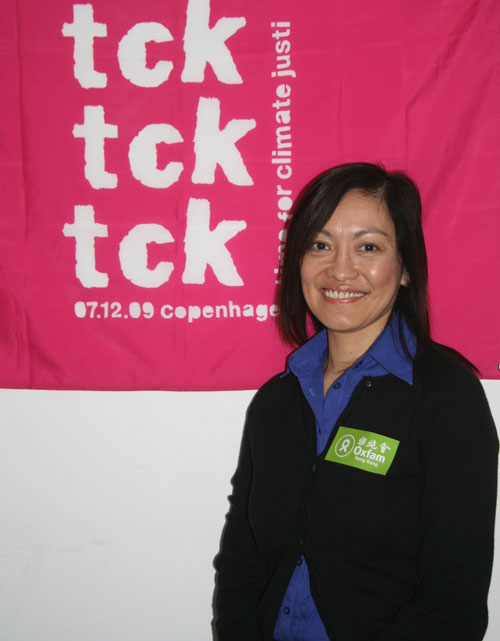Developed countries urged to tackle climate change
The UN is launching its 15th Conference of the Parties (COP 15) on climate change in Copenhagen this December, which hopes to set new targets of emission cuts for many countries and aims to reach a global agreement.
Lot Felizco is the policy director for Oxfam Hong Kong, a charity that aims to alleviate poverty and will be in attendance at the Copenhagen Conference next month. Felizco said that since the United Nations Framework Convention on Climate Change (UNFCCC) entered into force in 1994, developed countries haven’t really shown their willingness to deliver commitments on emission cuts, nor have they offered much financial help for developing countries.
 |
|
Lot Felizco[China.org.cn] |
Beginning in 1992, the United Nations set the first-ever international convention UNFCCC for tackling the emissions of carbon dioxide and other greenhouse gasses in the world. Three years later, the Kyoto Protocol was adopted during a UN meeting in Japan, setting specific targets of emission cuts mainly for developed countries.
"The responsibilities of climate change are really on the shoulders of the developed countries," said Felizco. "For developed countries, they are trying to avoid these commitments, and that makes it very difficult for the negotiations right now."
"This (emission cuts) is a historical responsibility for them. China has developed since the 1980s, but the climate change started from the Industrial Revolution. The developed countries got rich by heavily emitting green house gasses in the past centuries."
In addition, Felizco said, "A developing country like China, its emissions are largely from productions. And for China, about 1/3 emissions are coming from export, which export to countries like EU, and U.S. That's quite ironic. So who should be responsible for the climate change, is it China or the countries that depend on China’s production?"
Developing countries should do their part in climate change, Felizco said, and China has shown an attitude that it is willing to do its part for emission cuts. "But as other developing countries, China also faces huge poverty problem."
A team from Oxfam Hong Kong has been working on climate negotiations for about two years now. One of the most important tasks is to communicate climate change to people as much as possible.
"Why a charity like Oxfam would like to get involved in environmental issues, just because we see the climate change in the daily life of the people we work with," Felizco said.
"The farmers and fishers in Indonesia are suffering major loses mainly because the seasons are changed. The rainy season would come in the very fixed month before, so they know when to plant, when to fertilizer, and when to harvest. But now the seasons are changed so much, and they lose all their harvest because of that."
|
Some related figures: |
Source: the Unite Nation’s Millennium Development Goals Campaign Toolkit
|
In China, droughts are occurring more than in the past. In a report by Oxfam, some farmers in Gansu Province have had to leave their villages because it is no longer possible for agriculture.
"That’s happening across the world. Also if you look at the news, many disasters around are linked to the climate change," Felizco added.
Currently, to avoid the most catastrophic impacts of climate change, global temperature rise must be kept as far below 2°C as possible, as announced by international environmental group Greenpeace.
"To reach the target, the developed countries should be cutting emission 40 percent by 2020," said Felizco.
In the EU, only Norway has announced that it will target 40 percent emission cuts by 2020 so far. Norway is a small country, but as Felizco said, it shows the other political leaders that it is willing to take an active role.
"We know it will be very difficult to reach an agreement in Copenhagen, but we have to remain optimistic until very last minutes."
Groups like Oxfam have done a lot of work in preparation for the upcoming conference. "On October 24, more than 1,000 different events were held in a day in many countries," Felizco said. "This was saying we care about this issue and we want our leaders to make a right decision in Copenhagen."
In addition, Felizco said, "In the last a few weeks, it has been a lot of negotiations for the Copenhagen Conference. It also shows that our political leaders are taking this seriously."
"We hope there are not too many things left. Time is running out for us, the climate is keeping changing, and we can’t stop them. What we can do is to make our actions faster. In the worse case, maybe some issues are not solved, but here should be clear agreement on timeline."
 0
0 






